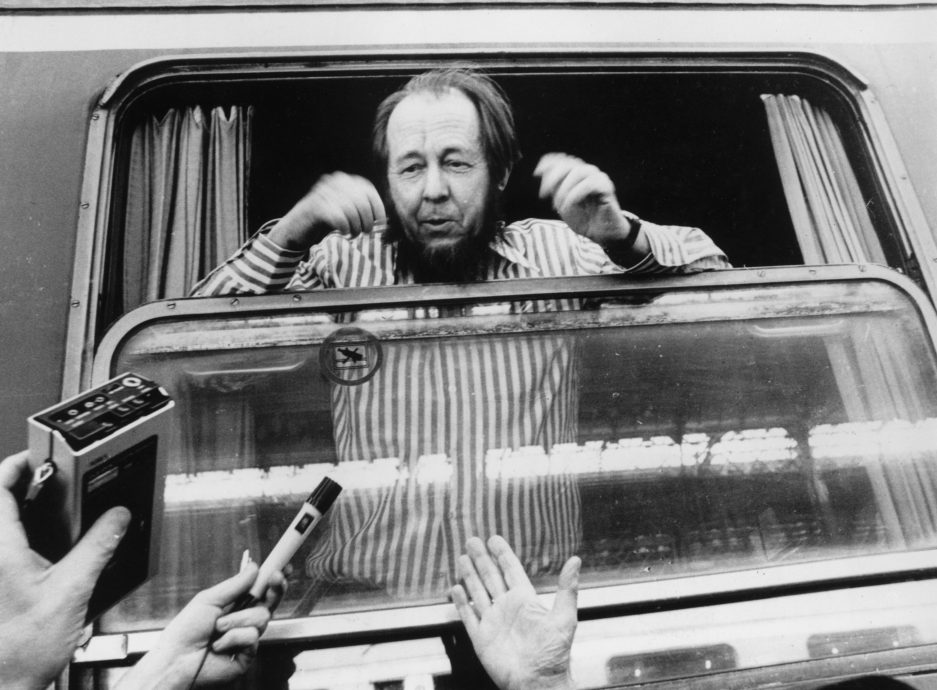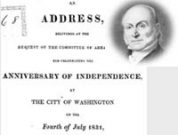Solzhenitsyn in Exile
Aleksandr Solzhenitsyn (1918-2008) wrote prose so searing to the conscience, so transcendent when spoken, so logically compelling that the only recourse of his Soviet enemies was to pull him apart limb by limb. Unable to do that because of his global status, Soviet officials used the classical tactic of exile. He had become, as the foreign policy analysts say, an existential threat to the Soviet Union. The Communist Party must have concluded that depositing him on the opposite side of the Iron Curtain would neutralize his threat. No longer would he be their tormented and harassed citizen. But that calculation only worked if Solzhenitsyn, in turn, exiled Russia from his own soul, put down his pen, and became a full-fledged national of a free country. That could not happen.
Solzhenitsyn remained a Russian patriot. His literary mission was the restoration of his homeland to a condition of liberty and flourishing that Leninist-Stalinism destroyed. This is the ultimate truth of the recently released English edition of Book 1 of Between Two Millstones, which is Solzhenitsyn’s account of his forced exile in the West in 1974. Solzhenitsyn arrived first in Cologne, Germany, and then spent nearly two years in Zurich before settling in a new home in Cavendish, Vermont, where he would stay until his return to Russia three years after the fall of the Soviet Union, in 1994.
Almost immediately, Solzhenitsyn stumbled in the West: mostly in public relations, but also royalties and contracts (his lawyer mismanaged his complex issues), struggling to find his interior life that he needed in order to write. He was ill-suited to navigate Western media and its childish curiosity, impatience, and need for invasive information. The press came straight away to Heinrich Böll’s country home outside of Cologne where Solzhenitsyn was staying. Böll’s wife, recognizing that Solzhenitsyn’s KGB-issued wardrobe simply wouldn’t do, had purchased a new shirt for him. Solzhenitsyn realized ironically that the purchased shirt he would greet the press in for a first impression closely resembled his old gulag uniform. Smile for the camera! Even though he sensed the media’s hunger for a statement, something worthy to print, Solzhenitsyn noted that “having just emerged from a great tumult, I was simply unable to humor them.” Prison is a hard place to shake.
Solzhenitsyn’s words, beginning in 1962 with the surprising publication in Russia of his short novel One Day in the Life of Ivan Denisovich, during a bit of a “thaw” in official oppression, shook the ground beneath the Soviet regime. The French release of a Russian language version of The Gulag Archipelago (1973) and the subsequent publications of numerous foreign language editions led to his forced expulsion from Russia. He had revealed to the world in unforgettable imagery and descriptiveness a secret system of mass repression, imprisonment, and death. Only Western academics could look the other way.
The strength of Solzhenitsyn’s soul is evident in The Gulag Archipelago, where he provides us with a personal testimony of how he grasped an authentic freedom and courage in his refusal to live as a slave to the authorities and their machinations during the years he spent in the labor camps for jokes he told about Stalin. Here, in this sick incarcerated empire within an even larger Soviet Communist empire, Solzhenitsyn unearthed the truth about communism. It lives in, through, and for injustice and lies. He would sound a related theme in the essay containing his last pre-exilic words to his countrymen, “Live Not by Lies!” Solzhenitsyn stated forthrightly that “even if all is under their rule, let us resist in the smallest way: Let their rule hold not through me!” At the very least, he urges a form of passive resistance: do not repeat lies.
What of the lies and misrepresentations told about Solzhenitsyn, which he repeatedly confronted? The French magazine Le Point made Solzhenitsyn its man of the year for 1975. They depicted him on the cover with brush-strokes of tar on his face. A Canadian television journalist lectured Solzhenitsyn for having formed provincial judgments during his time in the Soviet gulag. Of course, “how true! Life and death, imprisonment and hunger, the cultivation of the soul despite the captivity of the body: how very limited . . . ”
Meanwhile, back in America, Winston Lord, a senior aide to Secretary of State Henry Kissinger, remarked to a room full of junior diplomats that Solzhenitsyn was “just about a fascist.” Kissinger raged over President Ford’s accepting into the 1976 Republican Party Platform that Solzhenitsyn is a “great beacon of human courage and morality.” The master realist strategist had previously scuttled honorary citizenship for Solzhenitsyn, fearful of its effect on détente. Kissinger never understood the higher moral logic that governs us.
Why, though, did Solzhenitsyn seem like a fascist to Western thinkers? What does seem evident is that, early on, many press correspondents and reporters were eager to talk with Solzhenitsyn and tell his story. The problem was how he told his story. Contrary to their built-in assumption, he was no secular saint or good-willed socialist attempting to construct an ethical collectivist system. The April 1974 release of his “Letter to Soviet Leaders” almost pre-emptively doomed any enduring goodwill that Solzhenitsyn was likely to receive in the West.
Written in secret while he was still in Russia, the letter has him playing the part of Russian prophet appealing to the Soviet rulers about their errors and crimes, the stupidities of Marxism, the need for moral and spiritual renewal, and for Russia to breathe freely and comprehend itself again. He refers to “Holy Russia,” and puts forth “what I hold to be for the good and salvation of our people to which all of you—and I myself—belong.” This letter he wrote and sent to Soviet officials, in which he spoke truth to a corrupt system of power, made some in the West conclude that he must harbor a disordered love for Tsarist Russia. Solzhenitsyn condemned Marxism as the justifying edifice of Soviet brutality and of flatly erroneous assumptions in statecraft and economic policy. And by noting that atheism is the animating core of Marxism and its persecution of Christians in Russia, Solzhenitsyn touched a different nerve: that of the unofficial atheism in the chattering classes of Western capitals. And he capped his statement with: “I myself see Christianity today as the only living spiritual force capable of undertaking the spiritual healing of Russia.” Could this man be any weirder?
But he was no conventional conservative. While he defended property rights, the family, and religion, he did not see endless productivity and consumption as the goal of economic policy. Solzhenitsyn voiced Club of Rome-style opposition to mass industrial production and what he concluded was its product: environmental devastation. Russia also needed to tend its own garden for many years to come and leave the rest of the world alone. Isolationism. Solzhenitsyn pragmatically judged that a communist system could not change into a democratic political order without a transition period governed by a strongman. For this, Solzhenitsyn received an authoritarian label, a charge that continues to harm his reputation.
His opposition to a full tilt capitalist industrial economy should have earned him at least style points with his detractors. Except that he didn’t exactly frame it in the messianic environmental language they preferred. Solzhenitsyn spoke of self-limitation and curbing appetites and desires as much as he spoke of ecological harm. The environmental and human devastation wrought by Soviet industrial policy must have played a role in his thinking. How could it not?
The authoritarian business seems overwrought. What social and moral capital would a Russian democratic order have been built on after decades of destruction? With no functioning civil society, practices of political freedom, and representation, surely the order of the day in such a scenario would be order itself: property rights, the rule of law, and bodily security. Every human heart might generally desire political freedom. But such hearts must possess the responsibility and restraint to use it well. Soviet policy towards its citizens had acted as a solvent on basic decency. The key, which Solzhenitsyn endorsed, would be for the new Russian order to include healthy measures of subsidiarity for the development of those habits of ordered freedom.
Solzhenitsyn noted boldly, after Kissinger’s intervention to deny him honorary American citizenship, that it was akin to his failure to receive the Lenin Prize. “I do not fit in with either system, which is why at crucial moments opposing forces come to the fore,” he said. The West, for Solzhenitsyn, at best afforded him the space to fulfill his high literary calling. “My actions were determined by the fate of Russia, and the fate of Russia alone.” I sense the frivolity in the West, perhaps inseparable from tremendous wealth, turned him off. Communism was advancing internationally in the late 1970s, though. “How difficult it is, when living in prosperity, to be resolute and make sacrifices!” Solzhenitsyn saw a complacent West that needed to be stirred to action by him. It did not think so. Who would be its leader? Solzhenitsyn did not see good prospects in that regard. He said this, though, just a few years before Margaret Thatcher became Prime Minister of Great Britain and Ronald Reagan became President of the United States. Solzhenitsyn would praise both of these leaders in the 1980s. But these judgments made early in his exile show his underestimation of the tremendous resources in the West for renewal. Why exactly was the West so prosperous in a sustained manner? Surely, Solzhenitsyn should have entertained this and other questions.
He held to a more classical understanding of freedom, one bereft of a voluntarist conception of man creating his own willed reality, of humans determining their actions through their subjective appetites. There was “the full freedom of life” in exile, but “the golden rule of all freedom” is “to use it as little as possible.” My sense is that Solzhenitsyn conceived of freedom as man acting under God, participating in the Good, but that participation perfects its humble and listening subject slowly over time. It’s no longer a willed choice; it has become your nature. Freedom and virtue, perfection and the soul, now intermingle.
Solzhenitsyn did not generally see Western examples of free political orders that Russia, when emancipated from communism, should emulate. Instructive here is what he did gather and reflect on: deliberative democracy. He reports very favorably on a local Swiss political assembly in the intriguing canton of Appenzell, Switzerland. It was, he thought, a model for building democracy in Russia, from the ground up. Solzhenitsyn the alleged authoritarian said this.
From his adopted home in Cavendish he wrote prodigiously, and upcoming editions of the Notre Dame Press catalog will bear witness to it, including Book II of his exile memoirs. Upon returning to a fledgling post-communist Russia in 1994, he thanked the people of Cavendish at, where else, their town assembly. There is genuine gratitude expressed by Solzhenitsyn in this short address for the freedoms and flourishing enjoyed in the Green Mountain State. His children had grown up strong. The Solzhenitsyn’s had found their measure in Vermont, in America. Perhaps the Russian patriot touched the best of our own country while here.



